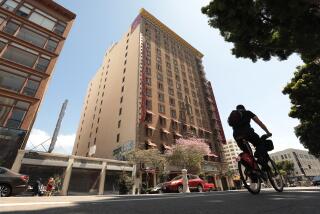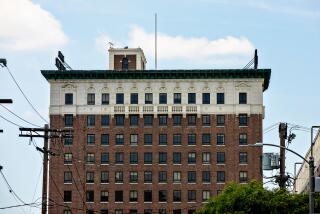Columbia S&L; Puts Newporter on the Block
- Share via
NEWPORT BEACH — Columbia Savings & Loan Assn., pounded by losses on its junk-bond investments and under regulatory pressure to sell off much of its real estate, has put the Hyatt Newporter hotel here up for sale.
In documents recently filed with the federal Securities and Exchange Commission, the thrift said it had hired a financial adviser late last year to market the Newporter, the first big resort hotel built in Newport Beach. Columbia, based in Beverly Hills, expects to sell the Newporter before the end of the year.
The Newporter, built in 1962, was instrumental in the development of Orange County’s beaches as a major tourist attraction.
But business has been tough on the Newporter, which has had five owners in 28 years, as newer hotels lured away many of its customers. And it faces still more competition when up to three new hotels--one of them also operated by Hyatt--open in the next few years on the nearby hills overlooking the coast between Newport Beach and Laguna Beach.
The hotel, part of the ambience of what many local residents consider “Old Newport Beach,” is a kind of landmark from the days when the beach city was still a small town. Still, with 415 rooms, the Newporter is among the 15 largest hotels in the county.
When Richard M. Nixon was President in the early 1970s and staying at his San Clemente estate, politicians and reporters frequently stayed at the Newporter. The guest register once also listed the likes of John Wayne and Diana Ross.
The thrift won’t say what it’s asking for the Newporter. But Le Meridien, a few miles inland and about the same size, brought an estimated $65 million from a Hong Kong investor last year.
And it’s also likely that a Far East investor may buy the Newporter, local experts say.
The Japanese, already among the largest foreign investors in U.S. real estate, like to invest in hotels because--unlike office-building rents--hotel room rates can be raised more frequently.
Hong Kong investors are said to be looking for more purchases in the United States as 1997 draws nearer, when the British colony reverts to China.
The fact that the hotel is up for sale has been kept quiet by Columbia, perhaps because, said a hotel consultant, “foreign investors don’t like a lot of publicity around these types of transactions.”
“Offshore investors won’t usually consider a property if they know it’s being marketed widely,” said David Philp, a hotel consultant at the Newport Beach office of accounting firm Pannell Kerr Forster.
Columbia bought the hotel, located on Jamboree Boulevard, for $26 million in 1985 from Ridgeway Ltd. of Newport Beach. Ridgeway had owned the hotel only since 1981 and spent more than $12 million renovating it. But occupancy rates, the company said then, continued to decline.
Columbia spent more on sprucing up the hotel and adding another 100 rooms to compete with the newcomers up the street at Fashion Island and at John Wayne Airport a few miles inland.
It wasn’t until last year that Hyatt took over management of the hotel. The firm had been looking for hotels to manage in the airport and Newport Beach areas.
Last year, Hyatt finally signed an agreement with the Irvine Co., the huge Newport Beach landowner, to build a new hotel in the Newport Coast development. The Hyatt hotel will be one of three overlooking the seashore between Newport Beach and Laguna Beach.
Hyatt began trying to promote the Newporter as a place for business travelers and corporate meetings, and the consultant selling the hotel for Columbia says that business is now “trending upward.”
The hotel sits on 26 acres and has its own small golf course, an unusually large amount of land for a hotel these days. But the hotel doesn’t own the land; it leases it under a 1981 agreement with the Irvine Co., and that lease runs to the year 2048.
That could complicate a sale, experts say, because foreign investors in particular like to own the land under the buildings they buy. A lease also makes it more difficult to borrow money to make the purchase. The county’s hotel market isn’t booming, either. It is overbuilt after a wave of new hotels were constructed in the middle and late 1980s.
The occupancy rate in Newport Beach and around the airport averaged 63.6% last year, according to Pannell Kerr Forster’s estimate, up little more than 3% from four years before. That means room rates have also stayed anemic, up to an average of only $74.83 a room from $72.01 four years earlier.
But the Newporter has an advantage in that it is still partly a resort hotel, even though the new Dana Point Resort and the Ritz-Carlton right on the water in Dana Point have outflanked it.
Hotels for business travelers have suffered the most from the competition, while the handful of hotels along the coast have done pretty well.
Columbia has to dump most of its real estate under new federal regulations designed to prevent another savings and loan disaster, when thrifts that dabbled rashly in real estate wound up losing billions of dollars.
Although the Newporter is actually owned by a Columbia subsidiary which the thrift says isn’t subject to the new regulations, the S&L; decided to sell the hotel too. It won’t say why, but the sale probably reflects unsatisfactory returns on the money that Columbia sank into expanding and renovating the hotel.
Columbia’s problems, however, didn’t come from commercial real estate, where its investments total less than $400 million.
Instead, the thrift made huge investments in the junk-bond market, which was already shaky when new regulations forced thrifts to divest their junk holdings.
Although Columbia was rendered insolvent and may not survive as an independent institution, the thrift’s financial adviser on the hotel sale says that won’t affect the price which, he says, “is reasonable but not a bargain.”
The adviser, Laurence Geller of Chicago hotel consultant Geller & Co., says he has been approached by several prospective buyers--not all of them Asian--and a sale could come soon.
“Spring is in the air,” he said, “and people like to buy real estate in the spring.”
More to Read
Inside the business of entertainment
The Wide Shot brings you news, analysis and insights on everything from streaming wars to production — and what it all means for the future.
You may occasionally receive promotional content from the Los Angeles Times.










